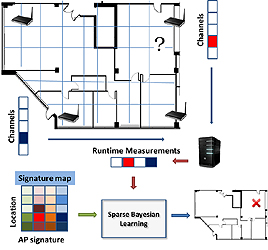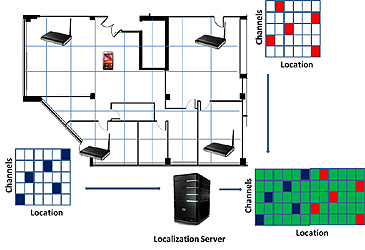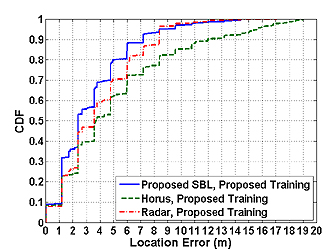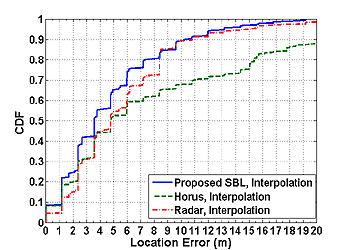Fingerprinting based localization techniques have recently witnessed significant progress due to high accuracy in determining the location of users in dynamic indoor environments, with minimal hardware interventions. Two issues however can potentially limit the accuracy and scalability of these systems.
We developed a novel multi-channel fingerprint-based indoor localization algorithm based on Received Signal Strength (RSS) measurements. The contribution of our work is threefold. First, we investigated the impact of different channels on the fingerprint’s characteristics and the effects of these changes on state-of-the-art indoor localization schemes. Second, we proposed a novel fingerprint collection technique that significantly reduces the calibration time, by formulating the problem as an instance of the recently introduced Matrix Completion (MC) framework. Third, we proposed the use of sparse Bayesian learning for the estimation of the user’s location. Experimental evaluation on real data collected from an indoor office environment highlight the superior performance of the proposed framework in terms of reconstructions error and localization accuracy. |
|
Training Phase
|
Testing Phase
|
|
We evaluated the performance of the proposed multi-channel system and compared it to traditional fingerprint based systems in the premises of the FORTH research institute. Experimental evaluation indicates that the MC-based training technique can form a better signature map compared to interpolation technique thus improving the localization accuracy of the fingerprint based positioning methods. Moreover, the proposed sparse Bayesian learning method outperforms traditional localization systems in terms of location error. Finally, the experimental results indicated that the proposed multi-channel approach leads to significant improvements in terms of location error compare to traditional single-channel approaches. |
|
Location error using Matrix Completion
|
Location error using Interpolation method
|
The MC-based technique leads to improvements of median location error |
|
ORION members involved: Sofia Nikitaki, Dimitrios Milioris, Grigorios Tsagkatakis, George Tzagkarakis and Panagiotis Tsakalides. [1], [4], [5], [6], [10], [15]
|
|
Compressed Sensing for Remote Imaging in Aerial and Terrestrial Surveillance
ACHIEVEMENTS





